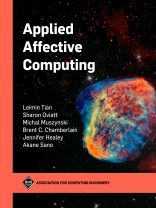Affective computing is a nascent field situated at the intersection of artificial intelligence with social and behavioral science. It studies how human emotions are perceived and expressed, which then informs the design of intelligent agents and systems that can either mimic this behavior to improve their intelligence or incorporate such knowledge to effectively understand and communicate with their human collaborators. Affective computing research has recently seen significant advances and is making a critical transformation from exploratory studies to real-world applications in the emerging research area known as applied affective computing.
This book offers readers an overview of the state-of-the-art and emerging themes in affective computing, including a comprehensive review of the existing approaches to affective computing systems and social signal processing. It provides in-depth case studies of applied affective computing in various domains, such as social robotics and mental well-being. It also addresses ethical concerns related to affective computing and how to prevent misuse of the technology in research and applications. Further, this book identifies future directions for the field and summarizes a set of guidelines for developing next-generation affective computing systems that are effective, safe, and human-centered.
For researchers and practitioners new to affective computing, this book will serve as an introduction to the field to help them in identifying new research topics or developing novel applications. For more experienced researchers and practitioners, the discussions in this book provide guidance for adopting a human-centered design and development approach to advance affective computing.
Despre autor
Akane is an Assistant Professor at Rice University, Department of Electrical Computer Engineering, Computer Science, and Bioengineering. She directs the Computational Wellbeing Group. Her research focuses on human sensing, data analysis and modeling, and intelligent system development for health, well-being, and performance. She is also a member of the Rice Scalable Health Labs. Her research spans the field of affective, ubiquitous, andwearable computing and biobehavioral sensing and analysis/modeling. Her research targets (1) the analysis and modeling of human ambulatory multimodal time series data including physiological, biological, and behavioral data and surveys for measuring, predicting, improving, and understanding human physiology and behavior and human factors such as health, well-being, and performance and (2) development of human-centered computing technologies for health, well-being, and performance. She has been working on developing tools, algorithms, and systems to measure, forecast, understand, and improve health and well-being using mobile and wearable sensors and devices in daily life settings, especially for measuring, predicting, and intervening/improving stress, mental health, sleep, and performance. She received her Ph.D. at MIT Media Lab and her M.Eng. and B.Eng. at Keio University, Japan. Before she joined Rice University, she was a Research Scientist in the Affective Computing Group at MIT Media Lab and a visiting scientist/lecturer at the People-Aware Computing Lab, Cornell University. Before she came to the United States, she was a researcher/engineer at Sony Corporation and worked on wearable computing, intelligent systems, and human–computer interaction. For more information on Akane’s research, please see: http://akane.sano.web.rice.edu/. Akane is the lead author of Chapter 4 and assisted on Chapter 9 of this book.












